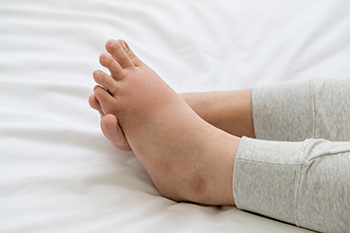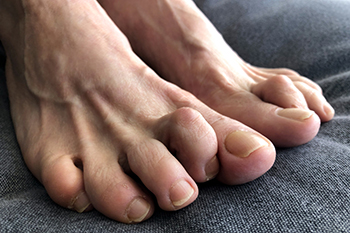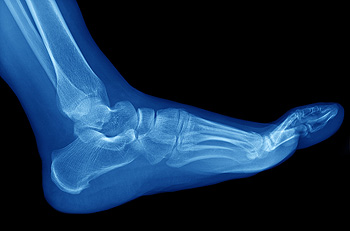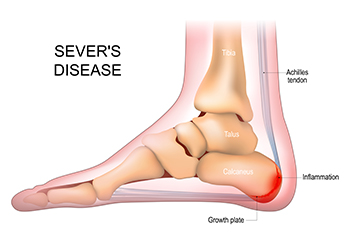

Swollen feet, also known as edema, is a common condition that can affect individuals of all ages. This ailment presents as an abnormal accumulation of fluid in the feet and ankles, causing them to appear larger than usual and often accompanied by discomfort. There are numerous reasons why feet may become swollen, ranging from minor to more serious causes. Among the most common triggers are prolonged sitting or standing, particularly in hot weather, which can lead to fluid retention. High salt intake, obesity, and certain medications can exacerbate this effect. Injuries and strains, such as a twisted ankle, may also result in localized swelling. Underlying health conditions, such as heart, kidney, or liver disease, can contribute to generalized edema throughout the body, including the feet. Furthermore, issues like deep vein thrombosis and lymphedema can cause foot swelling. Pregnancy, too, often leads to edema due to hormonal changes and increased blood volume. It is important to differentiate the cause of swollen feet, as some instances can indicate underlying health problems. If you have swollen feet, it is suggested that you confer with a podiatrist who can help you determine the cause and offer effective relief options.
Swollen feet can be a sign of an underlying condition. If you have any concerns, contact Dr. Harris L. Klear of Burlington County Podiatry Associates. Our doctor can provide the care you need to keep you pain-free and on your feet.
Swollen feet are a common ailment among pregnant women and people who stand or sit for extended periods. Aging may increase the possibility of swollen feet and patients who are obese often notice when their feet are swelling too. There may be medical reasons why swollen feet occur:
Swollen feet can also be caused by bone and tendon conditions, including fractures, arthritis, and tendinitis. Additionally, there may be skin and toenail conditions and an infection may cause the feet to swell. Patients who take medicine to treat high blood pressure may be prone to getting swollen feet.
Many patients elevate their feet to help relieve the swelling and this is generally a temporary remedy. When a podiatrist is consulted the reason behind the swelling can be uncovered and subsequently treated.
If you have any questions please feel free to contact one of our offices located in Marlton and Delran, NJ . We offer the newest diagnostic tools and technology to treat your foot and ankle needs.

Hammertoe is a common foot deformity that affects the alignment of toes, causing them to bend or curl downward instead of pointing forward. This condition can occur in any toe but is most often observed in the second or third toe. While some individuals may have hammertoe from birth, it frequently develops over time due to factors like arthritis or wearing poorly fitting shoes, particularly those with tight, pointed toes. The most noticeable sign of hammertoe is an abnormal bending or curling of the toe. This deformity often leads to discomfort, especially when wearing shoes or walking. The persistent pressure on the bent toe can result in the formation of corns and calluses. A hammertoe may also restrict flexibility in the affected toe, which can impede normal movement. Several factors increase the likelihood of developing hammertoe. A family history of the condition can elevate your risk. The persistent use of tight or pointy-toed shoes is a common risk factor, as these footwear choices can force your toes into an abnormal position. Wearing improperly fitting shoes over an extended period can lead to hammertoe formation. For help in dealing with a hammertoe, it is suggested that you make an appointment with a podiatrist for an exam and treatment options.
Hammertoes can be a painful condition to live with. For more information, contact Dr. Harris L. Klear of Burlington County Podiatry Associates. Our doctor will answer any of your foot- and ankle-related questions.
Hammertoe
Hammertoe is a foot deformity that occurs due to an imbalance in the muscles, tendons, or ligaments that normally hold the toe straight. It can be caused by the type of shoes you wear, your foot structure, trauma, and certain disease processes.
Symptoms
Risk Factors
Treatment
If you have hammertoe, you should change into a more comfortable shoe that provides enough room for your toes. Exercises such as picking up marbles may strengthen and stretch your toe muscles. Nevertheless, it is important to seek assistance from a podiatrist in order to determine the severity of your hammertoe and see which treatment option will work best for you.
If you have any questions, please feel free to contact one of our offices located in Marlton and Delran, NJ . We offer the newest diagnostic and treatment technologies for all your foot care needs.

Suffering from a stress fracture in the foot can be frustrating, but with proper care, you can facilitate healing and prevent complications. The first step is rest, and it is beneficial to avoid putting weight on the affected foot to prevent further damage. Wearing compression bandages can provide support and reduce swelling, but it is important to ensure they are not too tight. Additionally, elevating the injured foot can also help reduce swelling. For moderate to severe stress fractures, a cast or walking boot may be prescribed to immobilize the foot. This can be followed by gradually reintroducing weight-bearing activities under the guidance of a podiatrist. With patience and adherence to these care measures, you can expect a full recovery and a return to your active lifestyle. If you have endured a stress fracture of the foot, it is suggested that you consult a podiatrist who can accurately diagnose this condition and treat it accordingly.
Stress fractures occur when there is a tiny crack within a bone. To learn more, contact Dr. Harris L. Klear from Burlington County Podiatry Associates. Our doctor can provide the care you need to keep you pain free and on your feet.
How Are They Caused?
Stress fractures are the result of repetitive force being placed on the bone. Since the lower leg and feet often carry most of the body’s weight, stress fractures are likely to occur in these areas. If you rush into a new exercise, you are more likely to develop a stress fracture since you are starting too much, too soon. Pain resulting from stress fractures may go unnoticed at first, however it may start to worsen over time.
Risk Factors
Stress fractures do not always heal properly, so it is important that you seek help from a podiatrist if you suspect you may have one. Ignoring your stress fracture may cause it to worsen, and you may develop chronic pain as well as additional fractures.
If you have any questions, please feel free to contact one of our offices located in Marlton and Delran, NJ . We offer the newest diagnostic and treatment technologies for all your foot care needs.

Sever's disease, also known as calcaneal apophysitis, is a common but often misunderstood condition that affects growing children, particularly those involved in sports. The primary cause of Sever's disease is the rapid growth of bones in the feet during adolescence. This growth can outpace the development of the Achilles tendon, causing tension and irritation where the tendon attaches to the heel's growth plate. Symptoms typically include heel pain, which may be sharp, throbbing, or aching, especially during or after physical activities. The pain tends to worsen with pressure on the heel, especially during running or jumping. Children may also experience limping or discomfort while walking, particularly upon waking or after periods of rest. While Sever's disease is a self-limiting condition that resolves with time, it is a good idea to manage symptoms effectively. Adequate rest and performing gentle stretching exercises can help alleviate pain and promote healing. If your child complains of heel pain, it is suggested that you consult a podiatrist for guidance and to see if Sever's disease is causing the problem.
Sever's disease often occurs in children and teens. If your child is experiencing foot or ankle pain, see Dr. Harris L. Klear from Burlington County Podiatry Associates. Our doctor can treat your child’s foot and ankle needs.
Sever’s Disease
Sever’s disease is also known as calcaneal apophysitis, which is a medical condition that causes heel pain I none or both feet. The disease is known to affect children between the ages of 8 and 14.
Sever’s disease occurs when part of the child’s heel known as the growth plate (calcaneal epiphysis) is attached to the Achilles tendon. This area can suffer injury when the muscles and tendons of the growing foot do not keep pace with bone growth. Therefore, the constant pain which one experiences at the back of the heel will make the child unable to put any weight on the heel. The child is then forced to walk on their toes.
Symptoms
Acute pain – Pain associated with Sever’s disease is usually felt in the heel when the child engages in physical activity such as walking, jumping and or running.
Highly active – Children who are very active are among the most susceptible in experiencing Sever’s disease, because of the stress and tension placed on their feet.
If you have any questions, please feel free to contact one of our offices located in Marlton and Delran, NJ . We offer the newest diagnostic and treatment technologies for all your foot and ankle injuries.

Biomechanical problems of the feet can lead to various issues in the body, including foot pain. These problems often result from conditions consisting of fallen arches, overpronation, or supination. Fallen arches, known as flat feet, can occur due to excessive pronation, causing the foot to roll inward. Conversely, high arches can lead to supination, where the foot rolls outward. Both of these conditions can create imbalances in the body's mechanics, affecting the feet and other body parts, and leading to pain during activities like walking or running. Symptoms of biomechanical foot problems can include hip pain, knee pain, leg cramps, and ankle pain. Additionally, the lower back, Achilles tendon and the heel may be affected. Treatment options often include a gait analysis to understand walking patterns, orthotic devices, and shoe modifications. If you have foot pain, it is suggested that you make an appointment with a podiatrist for a thorough evaluation of your feet and ankles, and a treatment plan based on results.
Foot Pain
Foot pain can be extremely painful and debilitating. If you have a foot pain, consult with Dr. Harris L. Klear from Burlington County Podiatry Associates. Our doctor will assess your condition and provide you with quality foot and ankle treatment.
Causes
Foot pain is a very broad condition that could be caused by one or more ailments. The most common include:
Diagnosis
To figure out the cause of foot pain, podiatrists utilize several different methods. This can range from simple visual inspections and sensation tests to X-rays and MRI scans. Prior medical history, family medical history, and any recent physical traumatic events will all be taken into consideration for a proper diagnosis.
Treatment
Treatment depends upon the cause of the foot pain. Whether it is resting, staying off the foot, or having surgery; podiatrists have a number of treatment options available for foot pain.
If you have any questions, please feel free to contact one of our offices located in Marlton and Delran, NJ . We offer the newest diagnostic and treatment technologies for all your foot care needs.